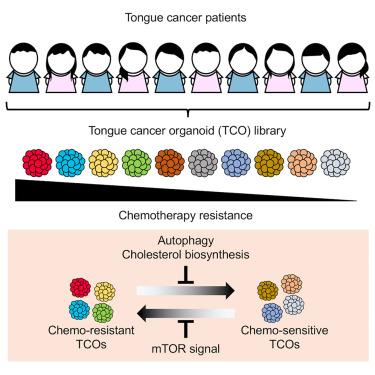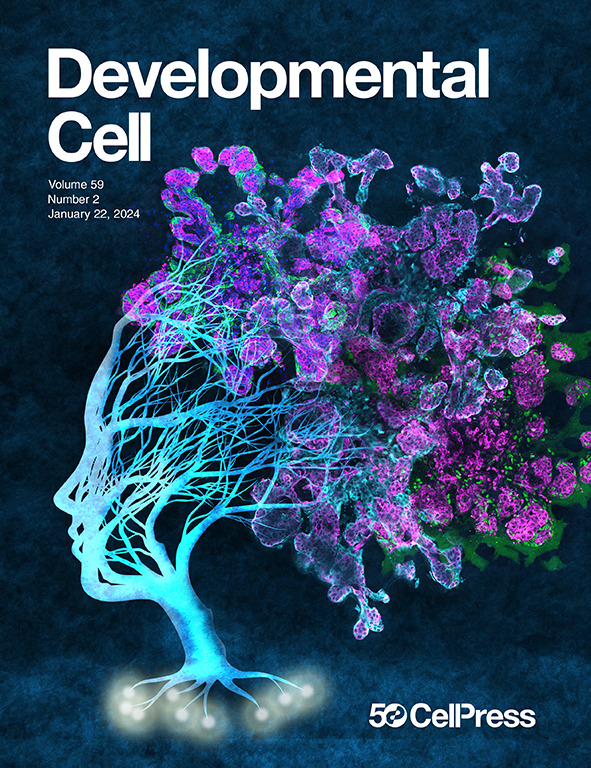对不同患者的舌癌组织细胞进行比较分析,确定极小残留病的遗传性质
IF 10.7
1区 生物学
Q1 CELL BIOLOGY
引用次数: 0
摘要
舌癌(TC)化疗后复发的原因是最小残留病(MRD),即化疗后残留的少量癌细胞。为了了解MRD在舌癌中的作用机制,我们从28名不同年龄和癌症分期的未经治疗的舌癌患者中创建了一个舌癌器官组织(TCOs)库。这些 TCOs 在体外和异种移植模型中都再现了原发性 TC 组织,并且有几个 TCO 株系在顺铂治疗后存活下来(化疗耐药 TCOs)。值得注意的是,化疗耐药 TCO 在治疗前表现出 "遗传性 "胚胎停育特征,并激活了自噬和胆固醇生物合成途径。重要的是,使用特异性抑制剂抑制这些途径可将化疗耐药 TCO 转变为化疗敏感 TCO。相反,用 mTOR 抑制剂激活自噬,则会使化疗敏感的 TCOs 具有化疗抵抗力。这一独特的模型有助于深入了解TCO中MRD的形成机制,从而找到有效的治疗方法,减少TCO的复发。本文章由计算机程序翻译,如有差异,请以英文原文为准。

Comparative analysis of tongue cancer organoids among patients identifies the heritable nature of minimal residual disease
The relapse of tongue cancer (TC) after chemotherapy is caused by minimal residual disease (MRD), which is a few remaining cancer cells after chemotherapy. To understand the mechanism of MRD in TC, we created a library of TC organoids (TCOs) from 28 untreated TC patients at diverse ages and cancer stages. These TCOs reproduced the primary TC tissues both in vitro and in a xenograft model, and several TCO lines survived after cisplatin treatment (chemo-resistant TCOs). Of note, the chemo-resistant TCOs showed “heritable” embryonic diapause-like features before treatment and activation of the autophagy and cholesterol biosynthetic pathways. Importantly, inhibiting these pathways with specific inhibitors converted the chemo-resistant TCOs into chemo-sensitive TCOs. Conversely, autophagy activation with mTOR inhibitors conferred chemo-resistance on the chemo-sensitive TCOs. This unique model provides insights into the mechanism of MRD formation in TCs, leading to effective therapeutic approaches to reduce the recurrence of TC.
求助全文
通过发布文献求助,成功后即可免费获取论文全文。
去求助
来源期刊

Developmental cell
生物-发育生物学
CiteScore
18.90
自引率
1.70%
发文量
203
审稿时长
3-6 weeks
期刊介绍:
Developmental Cell, established in 2001, is a comprehensive journal that explores a wide range of topics in cell and developmental biology. Our publication encompasses work across various disciplines within biology, with a particular emphasis on investigating the intersections between cell biology, developmental biology, and other related fields. Our primary objective is to present research conducted through a cell biological perspective, addressing the essential mechanisms governing cell function, cellular interactions, and responses to the environment. Moreover, we focus on understanding the collective behavior of cells, culminating in the formation of tissues, organs, and whole organisms, while also investigating the consequences of any malfunctions in these intricate processes.
 求助内容:
求助内容: 应助结果提醒方式:
应助结果提醒方式:


